|
|
|
Sort Order |
|
|
|
Items / Page
|
|
|
|
|
|
|
| Srl | Item |
| 1 |
ID:
154479
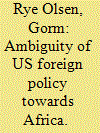

|
|
|
|
|
| Summary/Abstract |
Abstract
Since 9/11, the American policy towards Africa has been strongly influenced by national security interests and in particular by the fight against international terrorism and Islamic radicalisation. Traditionally, the American Africa policy has been the result of bureaucratic policymaking with the Pentagon and the State Department playing prominent roles. The paper argues that in the current century, evangelical Christian lobby groups have gained increasing influence on policymaking on Africa. Because policymaking has been influenced by a number of different actors, the American Africa policy may appear incoherent and ambiguous if judged narrowly on the expectation that it only aims to take care of US national security concerns and economic self-interests. The paper concludes that Africa was important to the United States during the presidencies of George W. Bush and Barack Obama because of the combination of strong security interests and strong domestic lobby groups that have pressured to place Africa on the US foreign policy agenda.
|
|
|
|
|
|
|
|
|
|
|
|
|
|
|
|
| 2 |
ID:
154471
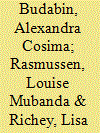

|
|
|
|
|
| Summary/Abstract |
The past decade has seen a frontier open up in international development engagement with the entrance of new actors such as celebrity-led organisations. We explore how such organisations earn legitimacy with a focus on Madonna’s Raising Malawi and Ben Affleck’s Eastern Congo Initiative. The study draws from organisational materials, interviews, mainstream news coverage, and the texts of the celebrities themselves to investigate the construction of authenticity, credibility, and accountability. We find these organisations earn legitimacy and flourish rapidly amid supportive elite networks for funding, endorsements, and expertise. We argue that the ways in which celebrity-led organisations establish themselves as legitimate development actors illustrate broader dynamics of the machinery of development.
|
|
|
|
|
|
|
|
|
|
|
|
|
|
|
|
| 3 |
ID:
154477
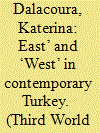

|
|
|
|
|
| Summary/Abstract |
The tired old civilisational categories of ‘East’ and ‘West’, loosely identified with ‘Islam’ and ‘modernity’, are alive and well, nowhere more so than in contemporary Turkey. The Justice Development Party (AKP) currently in government employs them assiduously to political advantage but they have a long history, having defined the parameters of societal identity and political discourse throughout the history of the Turkish Republic. The paper takes the strength of the categories as its starting point but moves beyond them by asking if discourses, narratives and identities, individual and collective, exist in Turkey which question, overcome and ultimately undermine the categories of ‘East’ and ‘West’. The paper starts by investigating the evolution of ideas about East and West since the late Ottoman period and accepts that they are still dominant. However, since the 1980s in particular, they are being undermined in a de facto way by cultural developments in literature and music, new trends in historiography and novel ways of relating to the past. In some ways in contemporary Turkey, the paper concludes, culture trumps the inherently essentialist idea of ‘civilisation’ and Turkish society is ahead of its political and intellectual elites.
|
|
|
|
|
|
|
|
|
|
|
|
|
|
|
|
| 4 |
ID:
154481
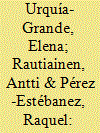

|
|
|
|
|
| Summary/Abstract |
The Democratic Republic of Congo (DRC) is a country with high natural resources, but it has suffered from decades of civil wars and social turmoil, being heavily aid-dependent. In the DRC, several Nonprofit Organisations (NPOs) are major players in fighting poverty and enhancing welfare. This research aims to analyse the effectiveness of small NPOs in improving poor peoples’ lives through health, education, and economic activities. Two NPOs working in the DRC, one in a rural and the other in an urban area, are compared by researching the aid sites and surveying 201 households (aid beneficiaries). Our case observations and the survey results facilitate analysing the mission accomplishment, effectiveness, and accountability of the NPOs although we admit that the DRC conditions make exact measurements difficult. Multivariate analyses are used to study the differences in aid impacts. There are significant differences in the beneficiaries’ perception of the NPO effectiveness in improving health while no significant differences in education impact were found. This is probably because both case NPOs have succeeded in getting a large proportion of the children of their area registered in the education centres created by the NPOs. Differences were observed in the accountability and reporting style of the NPOs.
|
|
|
|
|
|
|
|
|
|
|
|
|
|
|
|
| 5 |
ID:
154478
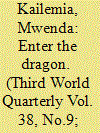

|
|
|
|
|
| Summary/Abstract |
This article draws on the theory and recent research on ‘ecological disorganization’- defined as ‘the ways in which human preferences for organizing economic production consistent with the objectives of capitalism are an inherent contradiction with the health of the ecological system’- to explore the ‘corporate violence’ apropos of Chinese investment in Africa. In line with other ecological disorganization theorists, we show how the deployment of Chinese capital in Africa structures and reproduces subjectivation, but also how, ultimately, this subjectivation is implicated in Africa’s ecological disorganization.
|
|
|
|
|
|
|
|
|
|
|
|
|
|
|
|
| 6 |
ID:
154480
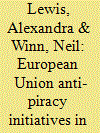

|
|
|
|
|
| Summary/Abstract |
Piracy off the coast of Somalia has resulted in a steady decline in trade through the Arabian Sea and higher costs of doing business for multiple world regions. The EU has responded to the threat with a large-scale anti-piracy operation in the Horn of Africa, which constitutes the first free-standing Common Security and Defence Policy (CSDP) military operation that is not entirely dependent on North Atlantic Treaty Organization (NATO) planning and assets. The operation is designed to interdict Somali piracy operations across the Gulf of Aden and to keep some of the world’s busiest sea lanes open for reasons of world trade. This article argues that the EU preoccupation with military solutions to the piracy problem, based on interventions through the Somali federal government with an emphasis on security, is insufficient because it fails to address the underlying causes of piracy and misunderstands the Somali socio-cultural-security nexus and the need for practical longer term land-based approaches to development. The reduction of Somali piracy activities can be linked to this increased military response capacity as well as to increased security precautions undertaken by shipping companies, but none of these strategies has succeeded in dismantling piracy networks. They therefore offer only a temporary and costly stopgap measure.
|
|
|
|
|
|
|
|
|
|
|
|
|
|
|
|
| 7 |
ID:
154476
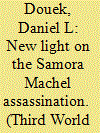

|
|
|
|
|
| Summary/Abstract |
In 1998, South Africa’s Truth and Reconciliation Commission (TRC) held hearings that investigated the possibility of foul play in the plane crash that killed Mozambican President Samora Machel on the night of 19 October 1986, near Mbuzini, South Africa. Eight persons testified in these special Section 29 hearings, held in camera because they dealt with events that remained politically volatile in the post-apartheid era. The recently declassified transcripts from these hearings strongly corroborate previous evidence indicating that the apartheid security forces caused Machel’s plane to crash, thereby eliminating one of colonialism’s most outspoken foes.
|
|
|
|
|
|
|
|
|
|
|
|
|
|
|
|
| 8 |
ID:
154482
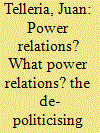

|
|
|
|
|
| Summary/Abstract |
The UN′s Sustainable Development Goals agenda points far into 2030, which shows that its post-war development endeavour is not functioning effectively. This article implements a discourse analysis of the UN Development Programme′s (UNDP) Human Development Reports (HDR) and exposes their internal contradictions. This analysis enables a critical reflection on the UNDP′s political position: its reports conceal the political causes of underdevelopment. By concealing the antagonistic/conflictual dimension of social issues – poverty, inequality, and exclusion – the UNDP naturalises the actual neoliberal order. The HDR turns political problems into technical issues; according to this approach, no power relations have to be changed in order to overcome underdevelopment.
|
|
|
|
|
|
|
|
|
|
|
|
|
|
|
|
| 9 |
ID:
154472
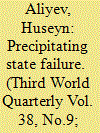

|
|
|
|
|
| Summary/Abstract |
This article examines whether the incidence of civil wars and the presence of violent non-state actors have an effect on state failure. Research on failed states has thus far prioritised armed conflicts as one of the key causes of state failure. This study challenges that claim and posits that civil war incidence has limited impact on the transition from fragility to failure. Global quantitative analysis of state failure processes from 1995 to 2014 shows that although armed conflicts are widespread in failed states, civil violence does not lead to state failure and large numbers of failed states become engulfed by civil war only after the failure occurs. By contrast, this study demonstrates a direct link between the presence of violent non-state actors and state failure.
|
|
|
|
|
|
|
|
|
|
|
|
|
|
|
|
| 10 |
ID:
154473


|
|
|
|
|
| Summary/Abstract |
Expertise stemming from the psy disciplines is increasingly and explicitly shaping international development policy and practice. Whilst some policy makers see the use of psy expertise as a new way to reduce poverty, increase economic efficiency, and promote wellbeing, others raise concerns that psychocentric development promotes individual over structural change, pathologises poverty, and depoliticises development. This paper specifically analyses four aspects of psy knowledge used in contemporary development policy: child development/developmental psychology, behavioural economics, positive psychology, and global mental health. This analysis illuminates the co-constitutive intellectual and colonial histories of development and psy-expertise: a connection that complicates claims that development has been psychologized; the uses and coloniality of both within a neoliberal project; and the potential for psychopolitics to inform development.
|
|
|
|
|
|
|
|
|
|
|
|
|
|
|
|
| 11 |
ID:
154474
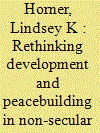

|
|
|
|
|
| Summary/Abstract |
This paper aims to positively engage with the religious character of many development contexts through an exploration of my own fieldwork in Mindanao. Through problematising a secular development industry and building on the momentum of the religious turn some scholars have identified, I share my initial explorations of how a postsecular framing might offer an alternative approach to development and peacebuilding. Through a deconstructive framing of the religious-secular binary I analyse the practices of one small non-governmental organisation (NGO) and suggest that a practice of ‘journeying with’ – Muslims and Christians on the shared philosophical/theological project to nourish each other’s faiths – can contribute to material and spiritual benefit, and the conditions to enable this.
|
|
|
|
|
|
|
|
|
|
|
|
|
|
|
|
| 12 |
ID:
154470
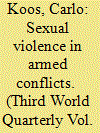

|
|
|
|
|
| Summary/Abstract |
Research on conflict-related sexual violence (CRSV) has grown rapidly over the last decade. This article consolidates existing social science research on CSRV according to two lines of inquiry: its causes and its consequences. Overall, research has considerably advanced our knowledge of the causes of CRSV, particularly in four aspects: purpose, context, individual motives and intra-group dynamics. However, there is a need to better understand the societal consequences of CRSV, in particular how it affects relations in families, and within and between communities. Overall there remains a shortage of empirical, in particular mixed-method, designs to produce research which is relevant for policymakers and practitioners.
|
|
|
|
|
|
|
|
|
|
|
|
|
|
|
|
| 13 |
ID:
154483
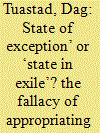

|
|
|
|
|
| Summary/Abstract |
To refer to Palestinian refugee camps as states of exception, appropriating the paradigm of Giorgio Agamben, is definitely tempting. Agamben argues that in times of crisis, individual rights of citizens are diminished and entire categories of people kept outside the political system. Nevertheless, there are flaws in applying Agamben’s perspective on Palestinian camps. It acquits the camp residents from the autonomy over their own political agency. Historically, in Lebanon, camp residents experienced an almost limitless access to free political organisation. But this access has not been converted into the development of representative, legitimate political structures.
|
|
|
|
|
|
|
|
|
|
|
|
|
|
|
|
| 14 |
ID:
154475


|
|
|
|
|
| Summary/Abstract |
How we understand the state is important when addressing issues of human rights. During the debate on the Anti-Homosexuality Bill in Uganda, the country was, at times, presented as nearly uniformly homophobic, exemplified by references to ‘Uganda’s Anti-Homosexuality Bill’. The state, which does discriminate against gender and sexual minorities, is comprised of different institutions and people, holding, at times, conflicting positions. This paper documents these differing positions that parts of the state adopted, along with how those positions changed over time in response to political changes and lobbying from civil society. Uncovering gaps in the coherence of the state by identifying these opposing views is useful both for how we understand and study the state, and for activism against political homophobias. Strategies against legislation similar to the Anti-Homosexuality Bill can target those within most likely to oppose such laws.
|
|
|
|
|
|
|
|
|
|
|
|
|
|
|
|
|
|
|
|
|